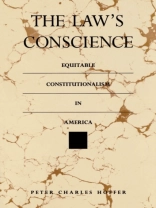The Law’s Conscience is a history of equity in Anglo-American juris-prudence from the inception of the chancellor’s court in medieval England to the recent civil rights and affirmative action decisions of the United States Supreme Court. Peter Hoffer argues that equity embodies a way of looking at law, including constitutions, based on ideas of mutual fairness, public trusteeship, and equal protection. His central theme is the tension between the ideal of equity and the actual availability of equitable remedies.Hoffer examines this tension in the trusteeship constitutionalism of John Locke and Thomas Jefferson; the incorporation of equity in the first American constitutions; the antebellum controversy over slavery; the fortunes of the Freedmen’s Bureau after the Civil War; the emergence of the doctrine of "Balance of Equity" in twentieth-century public-interest law; and the desegregation and reverse discrimination cases of the past thirty-five years. Brown v. Board of Education (1954) was the most important equity suit in American history, and Hoffer begins and ends his book with a new interpretation of its lessons.
Peter Charles Hoffer
Law’s Conscience [PDF ebook]
Equitable Constitutionalism in America
Law’s Conscience [PDF ebook]
Equitable Constitutionalism in America
Compre este e-book e ganhe mais 1 GRÁTIS!
Língua Inglês ● Formato PDF ● Páginas 316 ● ISBN 9798890866172 ● Editora The University of North Carolina Press ● Publicado 2000 ● Carregável 3 vezes ● Moeda EUR ● ID 9201321 ● Proteção contra cópia Adobe DRM
Requer um leitor de ebook capaz de DRM












